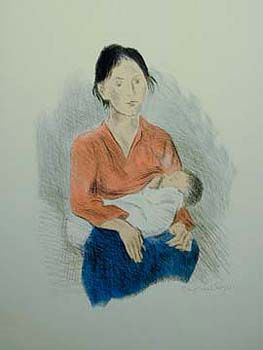
Raphel Soyer Hand Signed Publisher Proof Lithograph:"Nursing Mother Pink Blouse"
Artist: Raphel Soyer
Title: Nursing Mother Pink Blouse
Size: 30" x 22"
Edition : Publisher Proof
Medium: Lithograph
Year: 1979
Artist Biography: Born in Tombov, Russia in 1899, Raphel Soyer emigrated with his family to the United States in 1912. His siblings included a twin brother, Moses, and a brother, Isaac, who became successful artists. After settling with his family in New York City, the young Soyer pursued an art education at Cooper Union from 1914 to 1917, at the National Academy of Design from 1918 to 1922, and intermittently at the Art Students League. Soyer's earliest work was consciously primitive in manner. Until the late 1920s, he typically used frontal presentations, shallow pictorial space and figures rendered in caricature. Later, he developed a brushy, more gestural style that was tonal rather than coloristic. These early works are reminiscent of the paintings of Edgar Degas. Soyer's interest in depicting his urban environment was expressed early in his career in works such as Sixth Avenue (ca. 1930-1935, Wadsworth Atheneum). As the Depression continued, the artist turned more and more to subjects directly related to the prevailing economic difficulties. One result of the mass unemployment of the 1930s that caught Soyer's imagination was the new role of independent working women. Hemmed in by the crowd, the self-absorbed women in Office Girls (1936, Whitney Museum of American Art) are shown walking to or from work. Soyer's sympathetic study of unemployed men in Transients (1936, University of Texas) is an example of a less propagandistic social realist work. In addition to paintings, he executed a number of lithographs of Depression scenes. Soyer developed his subjects from New York City's poorer sections. Unlike the painters of the Ashean School 25 years earlier, Soyer and his contemporaries did not view the city as a picturesque spectacle. Instead, they dwelt on the grim realities of poverty and industrialization. Soyer's work, however, is less issue-oriented than that of fellow social realist artists Philip Evergood and Ben Shahn. After 1940, Soyer began to concentrate on the subject of women at work or posing in his studio. His technique grew more sketchy during the 1950s, but in his ambitious painting Homage to Eakins (1964-1965, National Portrait Gallery), he rendered the figures in a manner typical of his early work. Between 1953 and 1955, he edited Reality. He later wrote Painter's Pilgrimage (1962), Homage to Thomas Eakins (1966), Self-Revealment: A Memoir (1969) and Diary of an Artist (1977). In 1967, Soyer was given a retrospective at the Whitney Museum of American Art, and his paintings have been displayed at many museums and galleries. He has taught at the Art Students League, the New School and the National Academy of Design in New York City.
Description: All Prints are sale priced everyday! Professionally Frame any print from our dealer gallery starting at an additional $199 and receive free shipping!
Click here to view the framing options.
Title: Nursing Mother Pink Blouse
Size: 30" x 22"
Edition : Publisher Proof
Medium: Lithograph
Year: 1979
Artist Biography: Born in Tombov, Russia in 1899, Raphel Soyer emigrated with his family to the United States in 1912. His siblings included a twin brother, Moses, and a brother, Isaac, who became successful artists. After settling with his family in New York City, the young Soyer pursued an art education at Cooper Union from 1914 to 1917, at the National Academy of Design from 1918 to 1922, and intermittently at the Art Students League. Soyer's earliest work was consciously primitive in manner. Until the late 1920s, he typically used frontal presentations, shallow pictorial space and figures rendered in caricature. Later, he developed a brushy, more gestural style that was tonal rather than coloristic. These early works are reminiscent of the paintings of Edgar Degas. Soyer's interest in depicting his urban environment was expressed early in his career in works such as Sixth Avenue (ca. 1930-1935, Wadsworth Atheneum). As the Depression continued, the artist turned more and more to subjects directly related to the prevailing economic difficulties. One result of the mass unemployment of the 1930s that caught Soyer's imagination was the new role of independent working women. Hemmed in by the crowd, the self-absorbed women in Office Girls (1936, Whitney Museum of American Art) are shown walking to or from work. Soyer's sympathetic study of unemployed men in Transients (1936, University of Texas) is an example of a less propagandistic social realist work. In addition to paintings, he executed a number of lithographs of Depression scenes. Soyer developed his subjects from New York City's poorer sections. Unlike the painters of the Ashean School 25 years earlier, Soyer and his contemporaries did not view the city as a picturesque spectacle. Instead, they dwelt on the grim realities of poverty and industrialization. Soyer's work, however, is less issue-oriented than that of fellow social realist artists Philip Evergood and Ben Shahn. After 1940, Soyer began to concentrate on the subject of women at work or posing in his studio. His technique grew more sketchy during the 1950s, but in his ambitious painting Homage to Eakins (1964-1965, National Portrait Gallery), he rendered the figures in a manner typical of his early work. Between 1953 and 1955, he edited Reality. He later wrote Painter's Pilgrimage (1962), Homage to Thomas Eakins (1966), Self-Revealment: A Memoir (1969) and Diary of an Artist (1977). In 1967, Soyer was given a retrospective at the Whitney Museum of American Art, and his paintings have been displayed at many museums and galleries. He has taught at the Art Students League, the New School and the National Academy of Design in New York City.
Description: All Prints are sale priced everyday! Professionally Frame any print from our dealer gallery starting at an additional $199 and receive free shipping!
Click here to view the framing options.
Availability: Print only orders usually ship in 3-9 days. "Custom Framed" products are made to order by craftsman, so additional time is required. Please allow 3-4 weeks for delivery.












